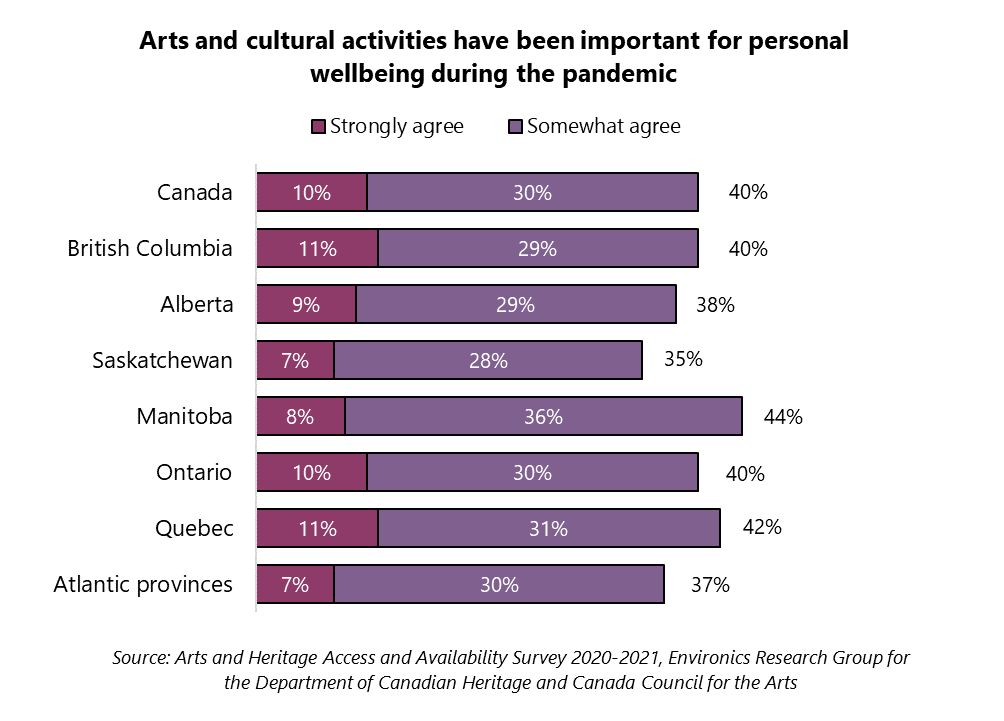Provincial similarities and differences in perceptions of the benefits of the arts and culture
Is there a consensus that the arts help bring people together and make communities better?
Last week, I explored national findings from survey data on public perceptions of the personal and societal benefits of the arts and culture. Today, I’ll highlight provincial similarities and differences regarding some interesting measures of the benefits of the arts.
The data source is a survey conducted in February and March of 2021 by Environics Research Group for the Department of Canadian Heritage and the Canada Council for the Arts. The survey had a large sample size (10,220 people 16 or older) that achieved a representative sample in each province west of New Brunswick, plus an overall estimate for the Atlantic provinces. The report for the survey notes that the sample was drawn from an opt-in panel, and no margin of error was calculated.
Territorial statistics are available but not reported here. A separate telephone survey, with 306 respondents, was conducted in the three territories, but the results related to the benefits questions may not be comparable between the territories and the provinces, because of the different mode of contact.
Are there differences between the provinces in residents’ agreement with statements regarding the value of the arts and culture for personal and social wellbeing?
Strong consensus that the arts help bring people together and make communities better
An analysis of the survey data shows that there is strong consensus among residents of all provinces that the arts and culture are a valuable way of bringing together people from different languages and cultural traditions, as shown in the first graph below. All the provincial percentages are very similar to the national average of 85%. In addition, there are only moderate differences in the percentages of residents who strongly agree with this statement.
Survey question
Please indicate your level of agreement with the following statement:
Arts experiences are a valuable way of bringing together people from different languages and cultural traditions.
Strongly agree / Somewhat agree / Somewhat disagree / Strongly disagree / Not sure
Provincial / regional sample sizes
Canada: 10,526. British Columbia: 1,383. Alberta: 1,153. Saskatchewan: 308. Manitoba: 359. Ontario: 3,921. Quebec: 2,355. Atlantic: 741. Three territories: 306.
Considerable agreement that the arts and culture make communities better places to live.
Across the country, a high proportion of residents agree that arts and cultural activities make communities better places to live. Residents in all jurisdictions, except for Quebec, are very close to the national average (84%). In all jurisdictions except Quebec, the proportion who strongly agree with this statement is close to the national average of 36%. Quebec residents are somewhat less likely to agree that arts and cultural activities make communities better places to live.
Survey question
Please indicate your level of agreement with the following statement:
Arts and cultural activities in a community make it a better place to live.
Strongly agree / Somewhat agree / Somewhat disagree / Strongly disagree / Not sure
In general, arts and culture are seen to be important for people’s quality of life
The proportion of Canadians who believe that arts and cultural events are important to their quality of life (70%) is slightly below the percentages for the previous two indicators (84% and 85%). Regarding quality of life, there are slight differences across the country.
In three jurisdictions (Saskatchewan, Quebec, and the Atlantic provinces), the proportion of residents who believe that arts and cultural events are important to their quality of life (67% in each) is slightly below the national average (70%). While a margin of error was not provided in the dataset, these differences would probably not be statistically significant. The proportion of residents indicating that arts and cultural events are very important does not differ much between the provinces, with a slight exception in Saskatchewan.
Survey question
How important to you are the types of arts and cultural events we've talked about in terms of quality of life for you and your family?
Very important / Somewhat important / Not very important / Not at all important
(Note: In the question, the “arts and cultural events we’ve talked about” relate to activities before or during the pandemic, including performing arts, visual arts, Indigenous arts, cultural festivals, museums, science centres, historic sites, archives, zoos, aquariums, and botanical gardens.)
Some variation in belief in the importance of the arts and culture for personal wellbeing during the pandemic
Among the four questions analyzed in this post, the lowest proportion of Canadians agree that arts and cultural activities have been important to their personal wellbeing during the pandemic (40%, compared with 70%, 84%, and 85% for the previous indicators).
There are some differences across the country, with the proportion in agreement ranging from 35% in Saskatchewan to 44% in Manitoba, as shown in the graph below.
Very few people strongly agree that arts and culture have been important to their wellbeing during the pandemic.
Of note, the proportion of residents who believe that arts and cultural activities have been very important for their wellbeing during the pandemic is in the single digits in Alberta (9%), Saskatchewan (7%), Manitoba (8%), and the Atlantic provinces (7%).
Survey question
Please indicate your level of agreement with the following statement:
During the COVID-19 pandemic, arts and cultural activities have been important for my personal wellbeing.
Strongly agree / Somewhat agree / Somewhat disagree / Strongly disagree / Not sure





